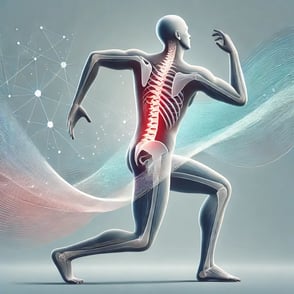Have you considered how your response to stress may affect how you move? I assume you know a lot about dealing with stress, especially from a mental standpoint. We all have stress. It is a normal part of our daily lives. We live in a fast paced society that does not slow down for anyone at any given time. It is up to you the individual to decide on how you deal with your stress. Does stress dictate how you move? Does it consume you?
Before continuing to read through, I encourage you to pause for a moment. Take in a soft 5 second inhale through your nose, pause for 5 seconds, and slowly exhale for 5 seconds through an open mouth. Repeat as needed.
As human beings we are not designed to deal with chronic stress. This is a modern problem that we have not physically adapted to. Our stress response is designed to deal with running away from a lion in the savannah. This would be considered a big external stimulus that *hopefully* does not happen all too often. We would get a rush of energy that allows us to make for a quick escape.
What is this rush of energy? It is an appropriate stress response. An increase in your heart rate and respiratory rate. Blood will travel away from the core to your extremities so you can get ready for a fight or flight response. This is a good response. We need this to survive. But what happens when that response is triggered from internal stimuli?
Us humans are unique, because we have the ability to THINK our way into stress.
- Someone cuts us off into traffic
- Our boss gives us an unrealistic deadline for a project
- Your stocks temporarily plummet in a volatile market
These are all real life examples of when our stress response can kick in.
I am not here to write about how this can mentally cloud your judgment. Or how you approach your daily life, that is up to a mental health or behavioral expert. My goal is to talk about how this can affect your physical body.
When we are under chronic stress, we tend to have an elevated heart rate and respiratory rate. This forces us to take more shallow breaths. The more shallow we breathe, the less we move our diaphragm (the most important muscle to pull air into the body). We begin to rely on superficial muscles in our neck and begin to shrug our shoulders to make it easier to breathe. This can lead to many cervical/neck problems if compounded over years (herniations, radiating pain, headaches, etc.)
When we are under chronic stress our body begins to stiffen up. We begin to take strategies of stiffness in our lower backs as a result of limited diaphragm movements. An immobile diaphragm creates the perfect environment for a stiff low back. This may cascade into a plethora of health issues over time (herniations, chronic pain, radiating pain to the legs, etc). Let’s take this stress and go complete our workouts with a stiff low back. All the hip stretching, cat/cow poses, glute strength activities won’t matter if we can expand the diaphragm. We need to quite literally pull air into our thorax in 360 degrees and these common exercises don’t do that.
If you have been dealing with any chronic injury, it is important to consider how this stress response is playing a role in your lack of healing. It is not uncommon for healing to drastically improve once we address how you deal with stress from a breathing standpoint. Once we can get the stress response under control, we may begin to coordinate your movements and introduce strength training into the mix. The sequencing of events matters.
You should not deal with a chronic condition and rely on medications and quick fixes. It is time for you to get an assessment from a stress perspective. You may run the risk of dealing with your pain for years to come otherwise.
At Revenant we take a full body approach to treating injuries, dealing with chronic pain, and improving overall performance. It is important to address all systems to get the maximum output you deserve and are looking for. Once we assess how you can maximize airflow into your body and improve joint range of motion, the changes are no longer transient. We strive for long term changes that you are in complete control over. Breathing is just the first step. If you skip it, you run the risk of overworking an already high stress system.
Tags:
Chronic Pain, Healing, Health, Rehab, Movement, Injury, Physical Therapy, Wellness, Back Pain, Ache, StressAugust 26, 2024
.png?width=322&height=138&name=Revenant%2Blong%2Blogo%2B(white).png)


-1.jpeg)
.jpeg)
-1.jpeg)
-1.jpeg)
-1.jpeg)
.jpeg)
.jpeg)
-1.jpeg)
Comments